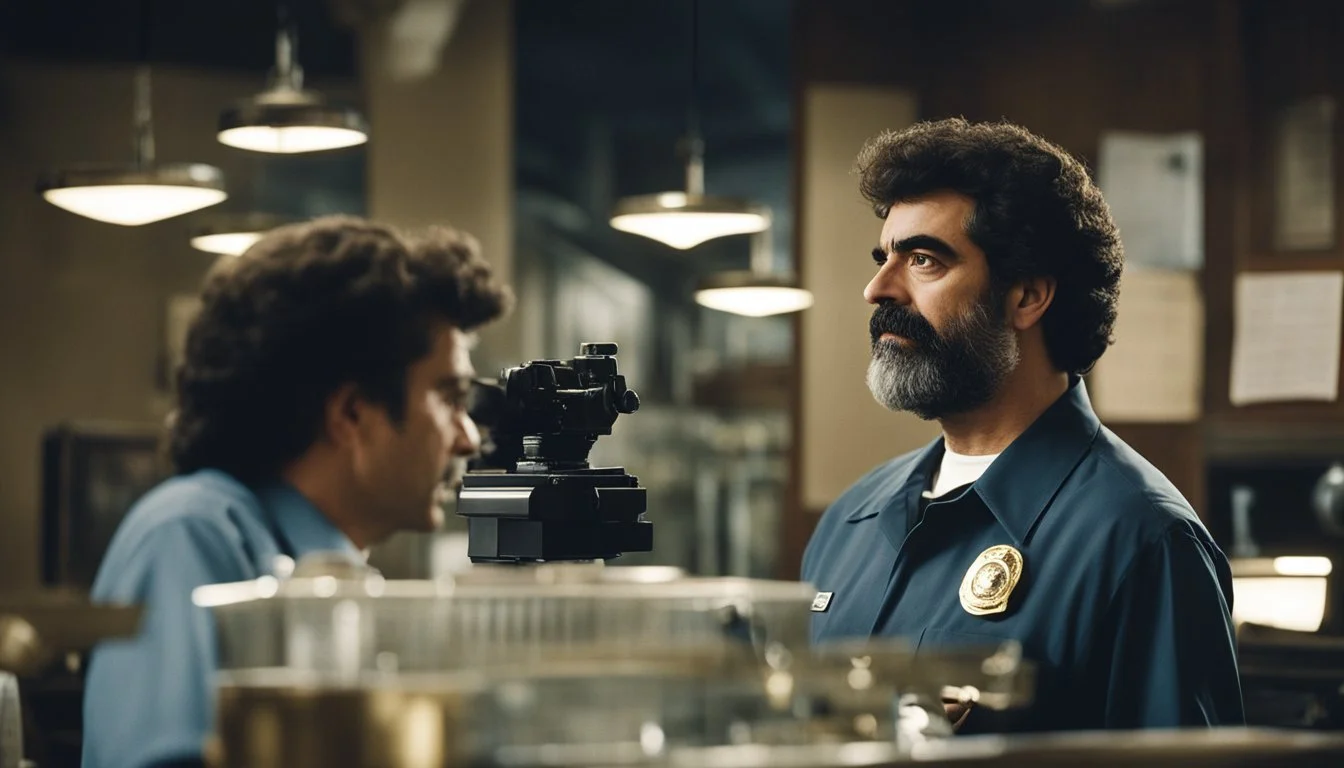Joe Berlinger: Chronicling True Crime's Darkest Chapters
Exploring a Master Documentarian's Impact
Joe Berlinger is a name synonymous with true crime documentary filmmaking. His unparalleled ability to delve into the darkest chapters of crime and social justice has made his work both compelling and crucial in contemporary media. With a career spanning over three decades, Berlinger has masterfully used visual storytelling to cast a critical eye on some of the most infamous criminal cases and societal issues.
From the critically acclaimed "Paradise Lost" trilogy that helped free the wrongly convicted West Memphis Three, to his more recent works like "Crime Scene: The Times Square Killer," Berlinger's documentaries are a powerful blend of investigative journalism and cinematic art. His commitment to truth and justice not only captivates audiences but also sparks important conversations about the American criminal justice system.
Berlinger's films, such as "Brother's Keeper" and "Whitey: United States of America v. James J. Bulger," do more than just recount historical events; they explore the human psyches behind them, offering audiences an intimate, often unsettling, look at both victims and perpetrators. His contribution to the genre is invaluable, elevating true crime documentaries to a medium for social change and deep, cultural reflection.
Early Life and Career of Joe Berlinger
Joe Berlinger, a prominent figure in true crime documentaries, experienced formative years that shaped his future career in the film industry. His entry into filmmaking was marked by influential experiences and mentorships.
Education and Formative Years
Born in Bridgeport, Connecticut, Joe Berlinger grew up in a Jewish family. He attended Colgate University, where he graduated in 1983 with a Bachelor of Arts in German Language. His time at Colgate was pivotal, exposing him to diverse cultural and intellectual pursuits that broadened his horizons.
Berlinger’s early academic focus on languages and humanities played a crucial role in his storytelling abilities. This background laid the foundation for his nuanced and compelling documentary work. After graduation, he moved to Frankfurt, Germany, which was a stepping stone to his later success in the film industry.
Entry into Filmmaking
Berlinger's introduction to filmmaking began with a position at an advertising agency in Frankfurt. This role provided him with practical knowledge and initial exposure to the media world. He soon transitioned to film, becoming an apprentice to notable documentarians Albert and David Maysles.
Working with the Maysles brothers was a transformative experience. It instilled in him a respect for authentic, real-life storytelling. This apprenticeship equipped Berlinger with critical skills and an appreciation for the documentary genre. These early career choices were instrumental in shaping his path as an award-winning filmmaker known for his contributions to true crime documentaries.
Filmmaking Style and Techniques
Joe Berlinger's filmmaking style has set a benchmark within the documentary genre, predominantly in the realm of true crime. His work is distinguished by detailed methodologies, narrative depth, and the integration of compelling visual and audio elements.
Documentary Methodology
Berlinger combines thorough investigative journalism with intimate personal stories.
He often spends extensive periods with his subjects, earning their trust and delving into their complexities. This approach enables him to portray nuanced details and unvarnished truths.
His collaboration with Bruce Sinofsky in "Brother's Keeper" exemplifies this, as they immersed themselves in the community to authentically capture the brothers' story. This deep dive aids in creating layered, empathetic portrayals of individuals and their circumstances.
Narrative Elements in Non-Fiction
Berlinger employs fiction-film techniques to craft his documentaries.
By structuring real events with a dramatic arc, he engages viewers on an emotional level. This technique is pivotal in his seminal work, the "Paradise Lost" trilogy, where real-life events are presented with dynamic storytelling.
Scenes are edited for maximum impact, ensuring that critical moments are highlighted to build suspense and convey the gravity of legal and social injustices.
Use of Visual and Audio Elements
Visual storytelling in Berlinger’s films utilizes artful cinematography to enhance the narrative.
He focuses on visually rich environments and significant details, which enables the audience to feel present within the story. Additionally, a stirring musical score is often employed to underscore the emotional undertones and tension of the scenes.
In productions such as "Crude," both the natural landscapes and the human impact are visually documented to underscore the film's environmental and social themes.
Major Works and Collaborations
Joe Berlinger has shaped the landscape of true crime documentaries with his insightful and impactful works. His collaborations have often brought critical acclaim and shed light on significant social justice issues.
The 'Paradise Lost' Series
One of Joe Berlinger’s most renowned works is the Paradise Lost trilogy. This series focuses on the West Memphis Three, who were wrongfully convicted of the murders of three young boys in Arkansas in 1993.
Paradise Lost: The Child Murders at Robin Hood Hills (1996), the first film in the series, was pivotal in bringing global attention to the miscarriage of justice in the case. The subsequent installments, Paradise Lost 2: Revelations (2000) and Paradise Lost 3: Purgatory (2011), continued to explore new evidence and the ongoing fight for the exoneration of the accused. This series played a crucial role in influencing public opinion and legal proceedings, ultimately leading to the release of the West Memphis Three in 2011.
Collaboration with Bruce Sinofsky
Joe Berlinger frequently collaborated with Bruce Sinofsky, and their partnership produced some of the most compelling documentaries in the true crime genre.
Together, Berlinger and Sinofsky co-directed the Paradise Lost series, which not only underscores the dynamics of their teamwork but also highlights their shared commitment to addressing injustices. Additionally, their collaboration extended to other projects such as Brother's Keeper (1992), a documentary that examines the controversial case of Delbert Ward, a farmer accused of murdering his brother. Through these works, the duo garnered critical acclaim and reinforced the importance of documentary film as a medium for social change.
Other Notable Documentaries
Apart from his collaborative projects, Joe Berlinger has directed numerous other significant documentaries that have cemented his reputation in the true crime genre.
Among them is the Crime Scene series, with installments such as Crime Scene: The Times Square Killer (2021), which investigates the dangers of New York's Times Square in the late 1970s and early 1980s. Additionally, Conversations with a Killer: The Jeffrey Dahmer Tapes (2022) delves into the mind of one of America’s most infamous serial killers through previously unheard taped interviews. Berlinger’s ability to present these stories with depth and sensitivity continues to captivate audiences and contribute to the discourse on criminal justice and societal issues.
True Crime Impact
Joe Berlinger's true-crime documentaries significantly influence public perception and drive awareness and advocacy.
Public Perception of Crime and Justice
Joe Berlinger's work reshapes how audiences view crime and justice. Through meticulous storytelling, he provides a detailed look into the complexities of crime. His series like "Crime Scene: The Times Square Killer" offer insights into criminal psychology and the investigative process.
Documentaries such as "Paradise Lost" highlight judicial flaws and the impact of wrongful convictions. By giving a voice to those involved, Berlinger sparks critical discussions. This influences public opinion on law enforcement practices and the criminal justice system.
Raising Awareness and Advocacy
Berlinger's documentaries are more than entertainment; they are catalysts for change. "Paradise Lost" played a pivotal role in the release of the West Memphis Three, showing the power of documentary filmmaking in advocating for justice.
His work emphasizes systemic issues in the criminal justice system. This inspires viewers to become advocates for those wronged by the system. Through educational content and compelling narratives, Berlinger's films drive social change.
Audiences are encouraged to understand the broader implications of crime. Berlinger's documentaries inspire active participation in justice reform and highlight the importance of holding institutions accountable.
Critical Reception and Awards
Joe Berlinger's work has consistently received acclaim for its depth and narrative quality. His docuseries and films often spark discussions and bring attention to critical social issues.
Awards and Nominations
Emmy Awards: Berlinger's documentaries, particularly the "Paradise Lost" series, have garnered multiple Emmy nominations.
Academy Awards: He received an Oscar nomination for "Paradise Lost 3: Purgatory."
Critic Reviews
Critics praise Berlinger for tackling complex subjects with sensitivity. His film Brother's Keeper holds a high rating on Rotten Tomatoes. Critics often cite his ability to humanize subjects and lay bare systemic injustices.
Industry Recognition
Berlinger was honored at various film festivals:
Sundance Film Festival: Several of his works, such as "Paradise Lost," have premiered here.
Tribeca Film Festival: "Intent to Destroy" received accolades for its investigative depth.
Within streaming platforms, Berlinger’s series, like "Crime Scene" on Netflix, have enjoyed widespread viewership and critical approval for compelling storytelling.
Crime Scene has been particularly well-received, resulting in Netflix renewing the series for additional seasons. The docuseries often lands in Netflix's top 10 viewed categories when new episodes are released.
Impact on Genre
Joe Berlinger is frequently referred to as a pioneer in true-crime filmmaking. His methodical approach and commitment to exposing truths continue to shape the genre, influencing many contemporary documentarians.
His dedication and skill in shining light on dark truths have solidified his place in documentary filmmaking.
Later Projects and Career Evolution
Joe Berlinger has consistently pushed the boundaries of documentary filmmaking, branching into scripted television and continuing to shed light on intricate true-crime stories.
Expansion into Scripted Television
Joe Berlinger expanded his repertoire to include scripted television, venturing beyond documentaries to explore new storytelling avenues. His work in this area includes projects like the film "Extremely Wicked, Shockingly Evil and Vile", in which he directed Zac Efron as infamous serial killer Ted Bundy.
This film artfully combined dramatic elements with factual storytelling, maintaining Berlinger’s signature approach of blending reality and fiction. His foray into scripted content demonstrates his versatility and dedication to exploring human complexities, whether through actors or real-life testimonies.
Implementing fictional techniques within factual frameworks, Berlinger’s influence on scripted television is marked by his ability to keep audiences engaged while staying true to historical accuracy.
Continued Work on True Crime
Berlinger has remained a significant figure in true crime, producing series like "Crime Scene: The Vanishing at the Cecil Hotel" and "Conversations with a Killer: The Ted Bundy Tapes" for Netflix. Each of these projects explores dark and complex narratives, peeling back layers of mystery, psychology, and societal impact.
His approach is characterized by in-depth research and intimate access, allowing viewers to experience the emotional depth and unsettling realities of criminal cases.
Projects such as "Shadowland" reflect his commitment to examining the impact of conspiracy theories and the human condition through a true crime lens. By maintaining a sharp focus on profound and often troubling realities, Berlinger continues to set the standard in documentary storytelling.
Influence and Legacy
Joe Berlinger stands as a pivotal figure in true crime documentaries. His work has pushed the boundaries of traditional storytelling in this genre.
His debut with Brother’s Keeper in 1992 redefined how crime stories could be told by presenting a deeply human perspective on the lives involved.
Berlinger's commitment to spotlighting injustice has been a defining element, influencing countless filmmakers. Titles such as Paradise Lost, which contributed to the exoneration of the West Memphis Three, exemplify his impact.
Key Projects:
Brother's Keeper (1992) - Started his directorial career.
Paradise Lost Trilogy (1996-2011) - Aided in freeing wrongly convicted individuals.
Crime Scene series on Netflix - Continuation of his work on high-profile, complex cases.
His unique approach often combines meticulous research with compelling narratives. By giving a voice to the unheard, he has made documentaries a powerful tool for social change.
Berlinger’s influence extends beyond his films. He has mentored up-and-coming documentarians and spoken frequently about the responsibilities and ethics involved in true crime storytelling.
His ability to foster discussions around difficult topics ensures his legacy is both influential and enduring. By challenging the status quo, Joe Berlinger has cemented his place as a transformative figure in the realm of documentary filmmaking.
Personal Life and Off-Screen Pursuits
Joe Berlinger, renowned for his impactful true crime documentaries, balances his professional endeavors with a vibrant personal life. A father and husband, Berlinger often speaks about the importance of family in interviews.
He is an advocate for mental health awareness, frequently participating in seminars and discussions.
Outside of filmmaking, Berlinger passionately engages in photography. He captures moments from his travels, often sharing his work on social media. His photography reflects his keen eye for detail, a trait that also enhances his film projects.
Berlinger also dedicates time to philhellenism, showcasing a deep appreciation for Greek culture. He often visits Greece, drawing inspiration from its history and landscapes.
In addition to his creative pursuits, Berlinger is committed to philanthropic activities. He supports several charities focused on justice reform and victim rehabilitation.
His schedule remains dynamic, balanced between professional commitments and personal interests that fuel his creative spirit.
Selected Filmography
Brother's Keeper (1992)
A documentary film exploring the controversial murder case of Delbert Ward, an elderly man accused of killing his brother in rural New York. The film focuses on the small community's perspective and the judicial process.
Paradise Lost: The Child Murders at Robin Hood Hills (1996)
Co-directed with Bruce Sinofsky, this film investigates the infamous case of the West Memphis Three, teenage boys wrongfully convicted of murder. It exposes the judicial flaws and raises questions about justice.
Metallica: Some Kind of Monster (2004)
This documentary dives into the personal and professional turmoil of the heavy metal band Metallica during the recording of their album "St. Anger." It provides an intimate look at the band's dynamic and struggles.
Whitey: United States of America v. James J. Bulger (2014)
Berlinger examines the case of notorious Boston gangster Whitey Bulger, delving into his criminal empire, subsequent trial, and the complex relationships between crime and the legal system.
Tony Robbins: I Am Not Your Guru (2016)
A close-up look at the world-renowned motivational speaker Tony Robbins, capturing the behind-the-scenes events of his annual "Date with Destiny" seminar. The film explores Robbins' methods and the lives he impacts.
Intent to Destroy (2017)
This film analyzes the Armenian Genocide and the ongoing denial by the Turkish government. It juxtaposes historical accounts with the making of a fictional film on the same subject, revealing the political and social implications.
Conversations with a Killer: The Ted Bundy Tapes (2019)
A Netflix docuseries unveiling the mind of infamous serial killer Ted Bundy through his own words, featuring interviews, archival footage, and detailed investigations.
The Cecil Hotel (2021)
A Netflix series that explores the mysterious death of Elisa Lam at the infamous Cecil Hotel in Los Angeles, delving into the hotel's dark history and the myriad theories surrounding the case.
Shadowland (2022)
Based on reporting from The Atlantic, this docuseries provides unprecedented access to people promoting conspiracy theories across the United States, reflecting on the societal impact of misinformation.
This selected filmography showcases Joe Berlinger's dedication to true crime and social justice, highlighting his impact on nonfiction filmmaking.








